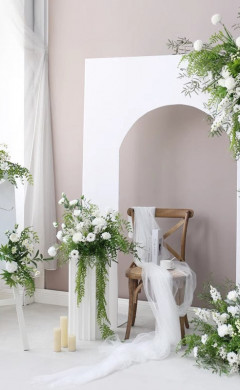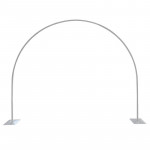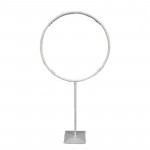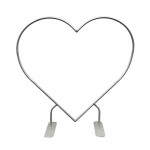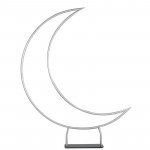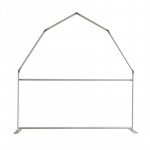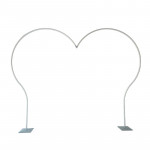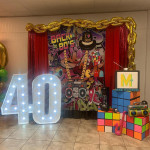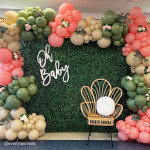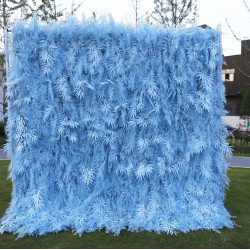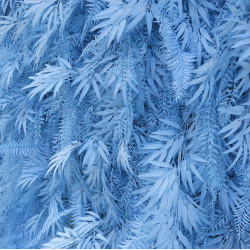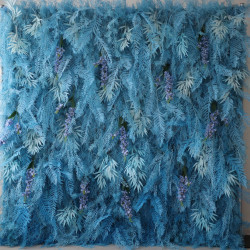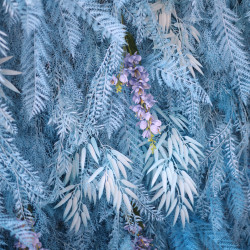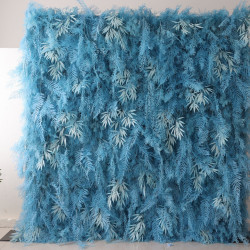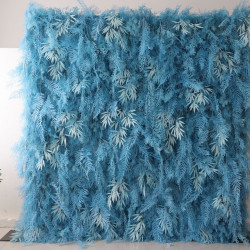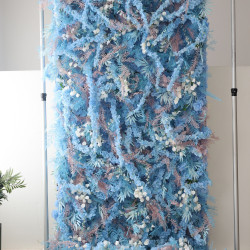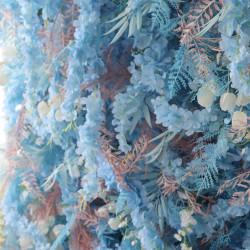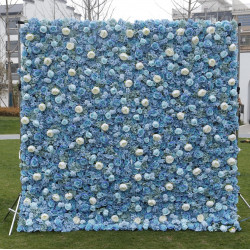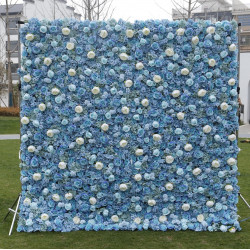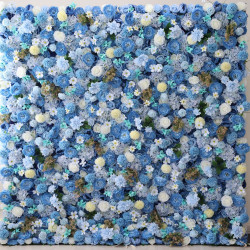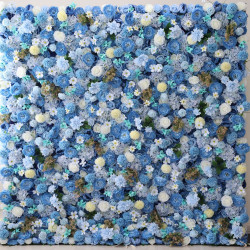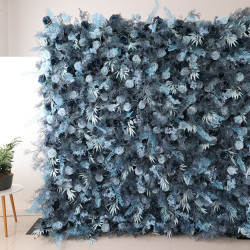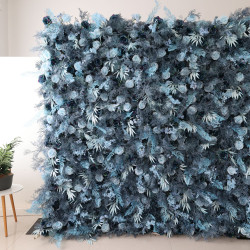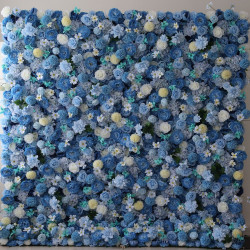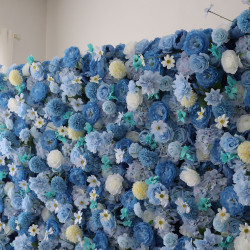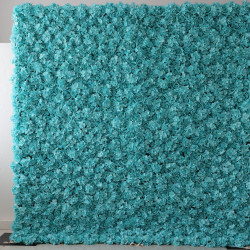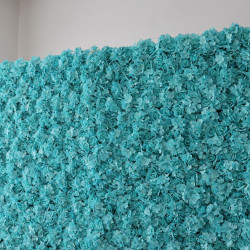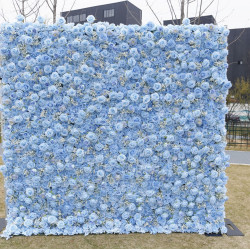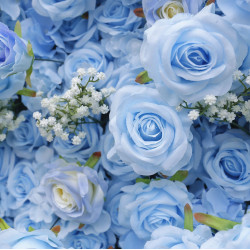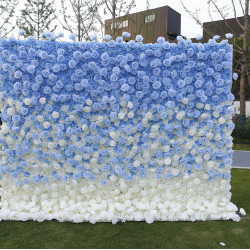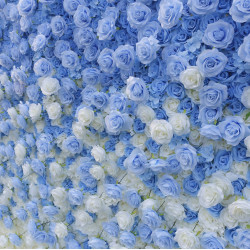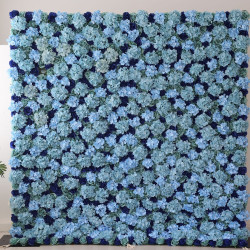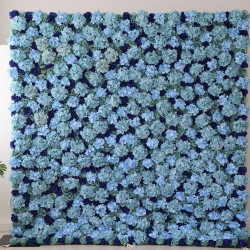Blue wall flowers
The Science of Blue Flowers
Almost infinite alternatives are available to you when choosing the color scheme for an event. Every color in the rainbow has a range of tints, hues, and tones. But that's not usually the case with flowers!
In actuality, flowers can only contain a limited amount of pigments. Porphyrins, which produce purple; carotenoids, which produce yellow, orange, and red; anthocyanins, which produce red, purple, or black; and betalains, which produce red and yellow, are examples of pigments. You'll see better pigments to create blue than these!
Florists must exercise creativity when suggesting blue accents to their clientele. By reading on, discover some of our best ideas for using blue flowers and accents in customer events!
More Details Behind Blue Blooms
Less than 10 percent of the 280,000 flowering plants are thought to produce blue flowers. Most blue flowers you see at events or wandering around New York City are created via science, art, or both!
By altering their pH balance, anthocyanins—the pigments that give some flowers their vibrant colors—can be changed. For instance, you need to change the pH balance of the soil in which the hydrangeas will be growing to cultivate blue hydrangeas. The hydrangea will turn blue instead of pink as a result.
Working in events requires knowledge of how to find and use blue flowers effectively. We must always be prepared to represent at any branded event we work on. This is because many businesses incorporate the color blue into their logos.
Blue Flower Walls and Their Traits
Finding naturally blue flowers is easy, even though they're less common than others. Though they are scarce, they are incredibly bright. See some of our top naturally occurring blue flowers below, along with some details about each one.
Hydrangea: As previously stated, hydrangeas require acidic soil with a pH balance of 5.5 or below to thrive. These flowers look fantastic when utilized in blue wall flowers , arrangements, and other projects.
Tweedia: These delicate little flowers are pretty charming. They add depth and variation in size, which goes well with more extensive arrangements.
Cornflower: As their name suggests, cornflowers grow wild in cornfields and thrive in full sun. These are frilly, soft flowers that give any occasion a delicate feel.
Thistle: You can add these thorny, spiky blossoms to any event decor! They offer arrangements, table decorations, and other items with a unique texture that is visually appealing. This provides a different experience from what most people are used to seeing. The items they provide are enjoyable to look at.
Delphinium: The show-stopper flowering plant that is constantly tall and graceful! When delphinium can genuinely make an impression, we love to utilize it in tall arrangements or hanging installations.
Agapanthus flowers add beauty to any arrangement, but they may appear more purple/blue than pure blue.
The hyacinth flower is indigenous to the eastern Mediterranean region. These petals are closely spaced and incredibly fragrant.
Clematis: Depending on the batch you're looking at, clematis can also occasionally seem purple. Loose, untamed designs showcase these flowers beautifully.
Anemone: Anemone flowers are known for their vivid colors and ability to draw attention. They look great with practically any design element since they command a room.
Gentiana: The deep blue color of these flowers is usually very vivid, making them ideal for an occasion that is moody, romantic, or deep.
Muscari: When wholly grown, their blooms resemble a cluster of grapes! Their cobalt blue tones work incredibly well with most other hues, and they offer a bright touch that gives bouquets and arrangements life.
These are just a few of our favorites, but this is a partial list of naturally blue flowers! Even so, we don't let it stop us when we can't get these at the flower market.
Painted Foliage & Other Elements
It might be enjoyable to suggest alternative distinctive components for an event's decor when a client requests a blue element but does not have any particular floral specifications. Our top picks for blue accents to include in the décor of an event are:
either simple or blue vases with blue-painted spatter
The blue-painted foliage
dried grasses coated in blue paint or dye
Blue-painted foliage
Blue-painted palms
Blue, non-floral aspects that are unconventional
Blue-painted grasses, palms, and foliage are all excellent choices for making a statement on any occasion. They can offer an animated element that visitors need to be used to seeing to an event's overall theme and decor. More subtly, painted vases function well and are both practical and non-distracting.
Using painting elements is a great way to perfectly match a business's name or logo color. These parts can enhance an event and improve a business's brand image. They can leave a lasting impact on guests.
Dyed Flowers
To make blue flowers, you can dye flowers that are not naturally blue. This will help you achieve the shade of blue you want. Our top picks for flowers to dye are:
- Phalaenopsis (orchids)
- Tulips
- Carnations
- Amaranthus
- Roses
This is by no means an exhaustive list. We have experience using dyed flowers for different design elements like flower walls, table decorations, arches, and branded installations. Customers and visitors may find it exciting to see something they're not accustomed to seeing, like blue, when using dyed flowers!
Faux Flowers & Other Faux Elements
You always have the choice to utilize fake flowers and other artificial items if you still can't find the ideal blue flower or accent! You can typically get whatever color and floral combination you seek for artificial flowers. Silk is used to make faux flowers, and it can be dyed to match whatever shade of blue you like—or any other hue, for that matter.
Other blue artificial components, including butterflies, fruits, vegetables, ribbons, and more, are not to be overlooked. These pieces can still be used to create a well-designed statement on any occasion, even when they are not flowers.
You can also incorporate blue paper flowers into the style of your event. Paper flowers can be skillfully designed and assembled to create a work of art that impresses visitors and encourages them to discover more about your company. No matter how unusual the blue color is, you may use all these blue components to create the dramatic, brand-driven design your customer wants at your next event.
Significance of the Color Blue in Weddings
This adage about "something old, something new, something borrowed, something blue…" is probably familiar to any American who has attended enough weddings. Generations of ladies have carried on this tradition on their wedding day.
What does that mean, though? From where does it originate? And why is wearing something blue to your wedding important? Everything you've ever wanted to know about "something blue" will be explained here:
The history of 'something blue.'
As with many American customs, Blue was first used as a significant wedding colour in Victorian England in the late 1800s.
The expression is "Something old, something new, something borrowed, something blue, a sixpence in your shoe."
The sentiment in such statements is genuine. With all those things at her disposal, it is hoped that a bride will enter married life with everything she needs for a successful and happy marriage. To find out what each sentence means, continue reading.
Starting old
First, an ancient object. The bride should wear one item from her life before meeting her future husband. The object she chooses should symbolize something she values from her time as a single person and wants to carry into her marriage.
Popular 'traditional' ideas for your happily ever after include the following:
- Family treasures or mementoes
- Love notes (printing text messages is a good idea for contemporary couples)
- A purse or a smaller bag that fits within one
- A book that you love
- The majority of people pair a new locket with an old photo. As seen in a romantic movie, you can still use this option even if you don't have an antique heart-shaped locket.
Going new
Then, something fresh. For the next phase of her life, the one she and her spouse will embark on together, a bride should dress in something new. This new item could be jewellery, a hairpiece, or her wedding gown. The 'new element' is among the most spartan customs to include in your wedding.
Borrowing power
Then, something fresh. For the next phase of her life, the one she and her spouse will embark on together, a bride should dress in something new. This new item could be jewellery, a hairpiece, or her wedding gown. The 'new element' is among the most spartan customs to include in your wedding.
- Wedding dress or veil
- Jewellery or a pair of shoes
- A purse or clutch
- Books, artwork, centrepieces, and vases are examples of wedding décor.
- The escape car
Something Blue
Something blue follows something borrowed. Blue has historically represented faithfulness and loyalty, particularly to one's marriage. Others said the bride needed blue to avoid bad luck or the evil eye.
To check the 'traditions' box, the colour need not be on your person or body. Anywhere might be the location!
The following are some suggestions for incorporating blue into your wedding:
- Clothes, such as underwear and socks
- Put flowers in your hair using pins.
- Dress your bouquet with a blue ribbon.
- Wear a blue boutonniere for the groom.
- Allow your bridesmaids to carry a bouquet of blue flowers.
- Use floral centrepieces to bring some colour to your reception table.
Sixpence in your shoe
The proverb's final item on the list is a "sixpence in your shoe."
The British currency known as "a coin worth six old pence," or sixpence, was discontinued in 1980. It is said that putting a coin in your shoe can bring good fortune in both life and business. The bride's father used to take care of things for her. Nowadays, the majority of brides utilize a penny or other metal cash.
Blue: The traditional wedding colour
Although it appears that white has always been the standard wedding colour, this is untrue.
Non-aristocratic women wore the finest dresses that they owned. The aristocracy hosted lavisher parties by following trends and flaunting their affluence with the newest styles.
The first documented bride to wear white was Philippa of England, who would become Queen of Norway, Denmark, and Sweden. In contrast to her ornate coronation garment, she wore a modest gown and a crown of flowers rather than jewels because she was marrying a man of lower status. She did this to ease her future husband's discomfort with the disparity in power.
During the Industrial Revolution, Queen Victoria of England and her daughters solidified the white dress's status as a custom. Modern technology brought about a new and expanding middle class. Women frequently sought ways to mimic the queen's regal rites and flaunt their wealth.
Queen Victoria wore a gown that the average person could imitate because she wanted her wedding to be less exclusive and extravagant. She asked her daughters the same question, and as photography was gaining popularity at the time, their images were widely shared and had a significant impact. This was a custom by the time of World War II.
Blue in modern weddings
Even though Blue isn't a standard colour for wedding dresses anymore, the phrase has kept it a minor yet significant element of many weddings.
The majority of brides follow the custom since Blue is a lovely hue. Furthermore, if accurate, it will undoubtedly help the couple's chances of remaining in love for many years.
The colour language of Blue
Psychological studies suggest that colours can evoke a range of emotions and moods.
In many cultures, blue symbolizes faithfulness and devotion, mainly regarding marriage and love. Let's look at Blue in its natural environment to see why it has the meaning it does.
Blue in the Natural World
Mother Nature adores blue. The changing colours of the sky, the feathers of a Blue Jay, or the rich tint of Lapiz Lazuli with its ethereal golden flecks are all examples of this. Humans have varying interpretations of colour. Some believe Blue is a calming colour that makes you feel at ease, while others think it's chilly, icy, and far away.
Blue is actually a combination of the two. Imagine the ever-changing colors of the ocean, where each shade of Blue is symbolized at various depths, times of day, and locations across the globe.
Blue, for you
Consider this: what emotions does the hue evoke in you? Do you have any specific associations with it, such as feelings, locations, people, or circumstances?
Personal experiences greatly influence the sentiments that colours create.
Something blue for your wedding: colour palettes
A blue wedding colour scheme is a stunning approach to boosting the a. Here are some instances of our brides going above and above with the "something blue for your wedding" assignment:
Going Royal: Dusty Blue and Navy
You may wonder if navy blue would work well for your wedding. The answer is a resounding "yes."
Darker hues, such as royal Blue or Navy, evoke ideas of devotion and tradition. The Navy is frequently used in design to provide depth and refinement. Since Blue is the hue of trust, businesses usually use it in their logos to establish trustworthiness with their customers.
With their dusty Blue and navy colour scheme, Chloe and Nathan's lakeside wedding was a celebration of timeless romanticism and coastal elegance.
The colour scheme was ideal for the location and the lake, from the groomsmen's traditionally dapper navy coats to the lovely bridal bouquet of blues. Dusty blue and navy hues connected this calm wedding to the lake and the surrounding environment, giving the happy couple a peaceful and affectionate beginning.
Rustic vibes: Russet Orange and Denim Blue
Orange is usually an intense colour that attracts attention right away.
Orange and blue go so well together because of this flaming excitement. The two shades are opposites in connotation and on the colour wheel. Orange is perceived as joyful, upbeat, and enthusiastic, whereas Blue can occasionally be perceived as chilly.
On a fantastic fall evening in the country, we have inspired our combination of denim blue and russet orange. This hot and cool collection features vibrant burnt orange hues and the cosy, everyday colour of denim blue.
Timeless: Dusty Rose and Navy
Dusty Rose and Navy would be the colour scheme for "I was born in the wrong time period." The pink hue of dusty rose has undertones of purple and beige, giving it a distinctively muted red colour. Although pink and red are frequently connected to romance, dusty roses, in particular, stand for gentle love, devotion, and innocence. Because of their subdued hue, dusty rose complements dramatic and sombre hues like Navy blue.
Fun details like burlap ribbons, wood signage, and Mason Jar centrepieces blended in with the idea of Megan and Mark's Southern-inspired wedding.
Megan's blue and dusty rose bridal bouquet was a classic combination of pearls, orchids, and roses. The groomsmen's dapper navy suits looked great with their dusty rose boutonnieres. The pair sat at their sweetheart table surrounded by a wooden background of dusty rose and blue garlands that complemented the Southern motif.
Romantic with Reds: Burgundy and Navy
'Romantic' and 'red' are so frequently used together that they almost sound clichés. However, there's a reason for this: red is the colour of intense love, passion, blood coursing through the body, and blazing fire.
The colours that Kaitlynn and Andrew have chosen for their wedding at the estate mansion combine to create a striking and beautiful scene. The classic wooden crucifix with its blue and burgundy flowers stood in front of the flamboyantly beautiful sweetheart table lit by lanterns.
Staying Blue
Consider your ' something blue' a treasured custom, whether you wear a sapphire, incorporate blue into your wedding theme colours, or get married by the sea.
